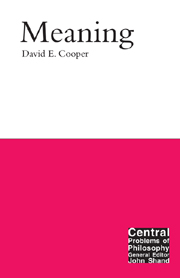4 - Knowledge, meaning and world
Summary
As in Chapter 3, the focus of the present one is linguistic meaning. However, the issues considered are not peculiar to that domain and it will sometimes be therapeutic to have reminders of this. It may be that certain views to be discussed sound rather less plausible when we recall that gestures and facial expressions, say, also have their meanings. The chapter covers a lot of ground, but the matters discussed are intimately related. To begin with, there is some unfinished business from Chapter 3. There we noted in passing a dispute as to whether understanding sentences has to do with grasping, not their truth-conditions, but those under which we are warranted in asserting them. We touched, as well, on a dispute as to whether speaker's meaning, rather than word- or sentencemeaning, is the more primitive notion. I shall return to those disputes, albeit briefly, in the context of considering issues – flagged in Chapter 1 – that may be subsumed under the heading of “knowledge and meaning”. In Chapter 1, I remarked that an account of meaning, besides saying something about the import, function and status of meaning, should address philosophical issues that reflection on meaning is apt to spawn. (“Besides” is perhaps not the right word, since the hope is that an account of, say, the status of meaning – notably one in terms of appropriateness to Life – will contribute to resolving the issues.)
The issues gathered under the heading “knowledge and meaning” fall into two kinds.
- Type
- Chapter
- Information
- Meaning , pp. 63 - 84Publisher: Acumen PublishingPrint publication year: 2003

